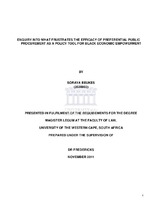| dc.description.abstract | Black Economic Empowerment (BEE) has been a topic of discussion since the dawn of democracy in April 1994. Due to the entrenched inequalities of the past, economic empowerment is very important for the economic growth of the majority of South Africa’s citizens. However, significant economic enrichment of black people has not been made, despite, economic success, legislation, state policies and programme interventions. This economic growth is to be realised through the use of preferential procurement as a policy tool for BEE. Whilst sufficient legislation has been enacted to regulate preferential procurement, to favour black people, much still seems to be lacking in the enforcement of the laws in public procurement. Central to the challenges of preferential procurement is the disharmony between the Framework legislation governing preferential procurement and BEE. This discord has seen two visions being followed for preferential procurement; the Procurement Act refers to the beneficiaries of BEE as historically disadvantaged individuals (HDI; s) and the goals for BEE are measured through specific goals which promotes narrow empowerment; the BBBEE Act on the other hand defines black people as the recipients of BEE and through the BEE Codes broad-based empowerment is promoted through seven core elements. This congruency has not served the promotion of preferential procurement, it has created a hindrance that frustrates economic growth for those it is intended. The other quandary that undermines the success of preferential procurement is willful practices engaged by both tenderers and public officials; skills deficiency in the adjudication of tenders and self-interest. The success of BEE through preferential procurement is dependent on a coherently legislated procurement environment fortified by perceptive public officials. The objective of this thesis is to analyse the impact of these challenges on the success of preferential procurement. The study will highlight the main practices that defeat the use of preferential procurement. This will include an analysis of the various legislation and the amendments thereto. In addition the enquiry will examine the proficiency of public officials in the adjudication of public tendering. Recommendations for a successful preferential public procurement environment will be made. The proposed thesis will utilise, inter alia, relevant legislation, case law, theses, journals, books and policy documents. | en_US |

